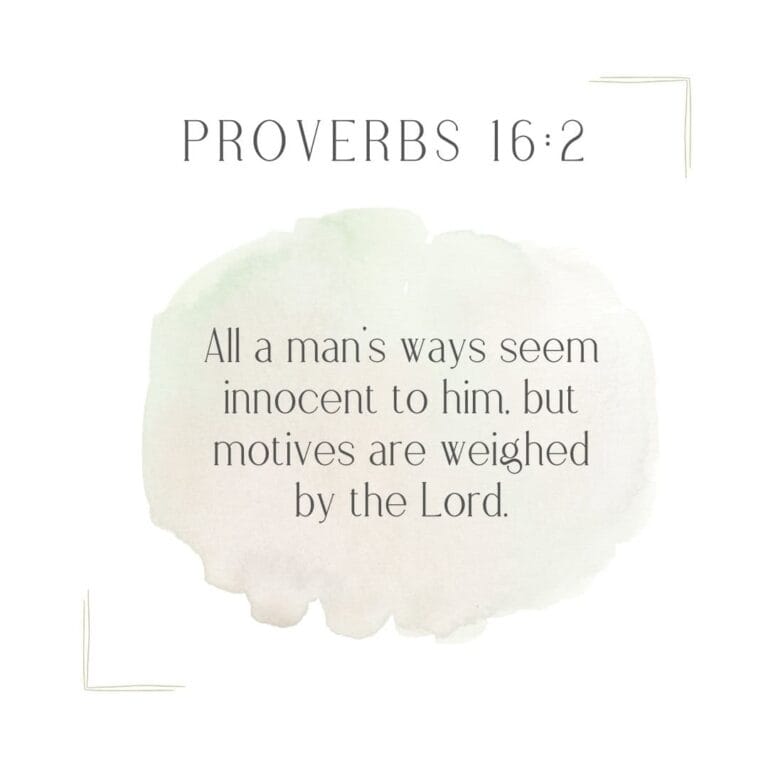As I started helping people in conflict work to reconcile, I knew what steps needed to be taken and what words and actions needed to appear in that process. But getting to the place where “they” recognized what needed to be done with regard to their own contribution to the problems was the big obstacle that began to show up for me.
Blackaby in his devotional (from Experiencing God Day by Day) nailed it. He noted how quick we are to question the motives of others, yet we are so slow to question our own! He pointed to Proverbs 16:2 – “All a man’s ways seem innocent to him, but motives are weighed by the Lord.”
Early on I learned the folly of telling someone what their contribution to the problem was – the immediate reflex response was for them to deny and defend their behaviors. And they then entrenched themselves even further in their “righteous” position.
Luckily, over time, I learned the better path was to ask questions that led them to examine and evaluate their behaviors in hopes they would discover, repent, confess to the other person and we could then travel that path to reconciliation.
As I worked through the greatest commandments with folks – Love the Lord your God with all your heart, body and soul and the second one – Love your neighbor as yourself – I found we all can agree wholeheartedly with those commandments. And yet, we were fooling ourselves about our own performance.
As Blackaby noted, when others harm us, we may assume the worst of intentions. But when we are guilty, we often excuse our offenses, concluding that others are far too sensitive! (blame-shifting is so easy to do, you see?)
And he takes us right to the “heart” of the matter – regardless of how we monitor our motives, God weighs them in His scales of righteousness. He’s right – it is futile to try to deceive God with our pious justifications because He “sees” our hearts.
So even if it looks good on the outside – especially to us – it is still possible to do the “right thing” for the wrong reason! But we are not alone in that – maybe looking at the biblical examples Blackaby shared would help us understand this better:
–Could you show concern for the poor and yet have a heart that is opposed to God? Yep – Judas did (John 12:4-8)
–Could you make bold statements of love for Christ and actually be aiding the work of Satan? Yep- Peter did (Matt. 16:21-23)
–Could you offer sacrifices to God and be in total disobedience to Him? Yep – King Saul did (1 Samuel 13:8-9)
–Could you pray with the wrong motives? James said you can (James 4:3)
So what causes us to do what we do? Our motivation often is fueled by good things – loving God, compassion, generosity and faith. But to Blackaby’s point, our actions can also come from unhealthy motives such as pride, insecurity, ambition, lust, greed, guilt, anger, fear, and hurt. It is possible to do the best things based on the worst motives.
So, digging for our motive is the work we need to do. I have learned to keep working on those really good questions to help people examine themselves. And Ken Sande’s training (and his Peacemaker book) have helped greatly to combine the questions and biblical principles.
Ken asks “How can I show Jesus’ work in me by taking responsibility for my contribution to this conflict?” and then guides people to Matthew 7:5 “You hypocrite, first take the plank out of your own eye, and then you will see clearly to remove the speck from your brother’s eye.”
As I listened to a recent podcast of Ken’s, he shared a story where he and his wife, Corlette, had gotten into a heated disagreement. She retreated to the next room and he steamed and prepared his arguments (he admitted that as a lawyer, he could use his cross-examination skills to win such battles). But as he made his way to go confront Corlette, the Lord kept putting this question into his head: “How can you please and honor me (the Lord) in this situation?”
He dismissed the question and resisted a couple more times practicing his best arguments about why he was right, etc. And then as he opened the door and stepped in to talk to Corlette, he was finally convicted by that question the Lord kept putting to him. He thought, I teach this stuff, I know better, etc. And his words came out – he apologized for what he had done to offend her.
Interestingly, he said Corlette had been gearing up for the debate and was ready to fire back as needed (and I know Corlette, she is a sweet, mild-mannered person by nature). As Ken described it, she was “ready to rumble”. But as soon as he apologized, she softened and then she apologized saying she really was the one who started the problem. The defusing of anger and reconciling could then proceed.
Looking back at the Proverbs verse above we can see the important key to this issue of motivation – “…but motives are weighed by the Lord”. When the Lord measures our motives, says Blackaby, He looks for one thing: LOVE. All that we do should proceed from our love for God and for others (1 Cor. 13).
What’s my takeaway? I need to take time to look past my own actions to what lies behind them and help others do the same by using introspective questions – the same ones that work for me.
Blackaby shared a jewel of a question – ask God to show you what He sees when He examines your motives. Powerful!


